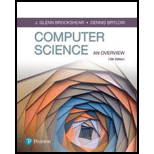
Suppose an amateur programmer writes a program for his or her own use and in doing so is sloppy in the program’s construction. The program does not use the
Want to see the full answer?
Check out a sample textbook solution
Chapter 6 Solutions
Computer Science: An Overview (13th Edition) (What's New in Computer Science)
Additional Engineering Textbook Solutions
Starting Out with C++ from Control Structures to Objects (8th Edition)
Objects First with Java: A Practical Introduction Using BlueJ (6th Edition)
Java How To Program (Early Objects)
Database Concepts (7th Edition)
Digital Fundamentals (11th Edition)
Starting Out with Programming Logic and Design (4th Edition)
- What is the main difference between testing and debugging when applied to a computer program?arrow_forwardTo what extent does it make sense to speak of "debugging" a computer program?arrow_forwardDoes the term "debugging" have a specific meaning when used to the field of computer programming?arrow_forward
- To what extent does the phrase "resist the impulse to code" apply to computer programming?arrow_forwardWrite a C# program that plays a guessing game with the user. Your program should select a random number between 1 and 50 and then let the user try to guess it. The program should continue asking the user for a number until he guesses correctly. (See below for some tips on random numbers). CHALLENGE #1: Modify your program so that it only allows the user 10 guesses, and then declares them to be an inadequate guesser if they haven’t gotten it correct. Your program should output the random number chosen. CHALLENGE #2: Modify your program so that after they guess a number (or get declared inadequate, if you do Challenge #1) that it asks them if they want to play again, and responds accordingly. Some Random Number Generation HintsRandom rndNumber = new Random();Console.WriteLine(rndNumber.Next()); //random integerConsole.WriteLine(rndNumber.Next(101)); //random integer between 0 and 100Console.WriteLine(rndNumber.Next(10, 43)); //random integer between 10 and…arrow_forwardWhat's the main difference between testing and debugging when it comes to a computer program?arrow_forward
- errors in a computer program can be classified according to when they are detected and, if they are detected at compile time, what part of the compiler detects them. Using your favorite imperative language, give an example of each of the following. (a) A lexical error, detected by the scanner (b) A syntax error, detected by the parser (c) A static semantic error, detected by semantic analysis (d) A dynamic semantic error, detected by code generated by the compiler (e) An error that the compiler can neither catch nor easily generate code to catch (this should be a violation of the language definition, not just a program bug)arrow_forwardIn dynamically typed languages, a type error is unnoticed if the statement containing the error is neverexecuted.Answer: true falsearrow_forwardThe linker mean: A program that combines the object program with the programs from libraries A program that loads an executable program into main memory. A program that translates instructions written in a high-level language into the equivalent machine language. The machine language version of the high-level language program. A program that translates a program written in assembly language into an equivalent program in machine language.arrow_forward
- Procedural programming has its limitations because it does not foster the development of new ideas. The principle of "Everything is an object" is taught through the practise of object-oriented programming (OOP).arrow_forwardWhen it comes to programming, having access to more information is preferable than having fewer information available, but you shouldn't make decisions based only on how well something functions.arrow_forwardIn the context of software development, what does the phrase "debugging" refer to?arrow_forward
- Programming Logic & Design ComprehensiveComputer ScienceISBN:9781337669405Author:FARRELLPublisher:Cengage
 Microsoft Visual C#Computer ScienceISBN:9781337102100Author:Joyce, Farrell.Publisher:Cengage Learning,
Microsoft Visual C#Computer ScienceISBN:9781337102100Author:Joyce, Farrell.Publisher:Cengage Learning, EBK JAVA PROGRAMMINGComputer ScienceISBN:9781337671385Author:FARRELLPublisher:CENGAGE LEARNING - CONSIGNMENT
EBK JAVA PROGRAMMINGComputer ScienceISBN:9781337671385Author:FARRELLPublisher:CENGAGE LEARNING - CONSIGNMENT


